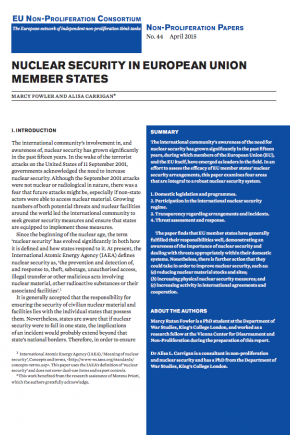Nuclear Security in European Union Member States

Non-proliferation Paper No. 44
The international community’s awareness of the need for nuclear security has grown significantly in the past fifteen years, during which members of the European Union (EU), and the EU itself, have emerged as leaders in the field. In an effort to assess the efficacy of EU member states’ nuclear security arrangements, this paper examines four areas that are integral to a robust nuclear security system.
1. Domestic legislation and programmes.
2. Participation in the international nuclear security regime.
3. Transparency regarding arrangements and incidents.
4. Threat assessment and response.
The paper finds that EU member states have generally fulfilled their responsibilities well, demonstrating an awareness of the importance of nuclear security and dealing with threats appropriately within their domestic systems. Nonetheless, there is further action that they could take in order to improve nuclear security, such as: (a) reducing nuclear material stocks and sites; (b) increasing physical nuclear security measures; and (c) increasing activity in international agreements and cooperation.
